Part 21: Fixing Golden Sun: Part 3
This update is going to be a bit more difficult than the last few, as Camelot did everything in its power to make the poor design decisions and terrible writing as integral to the experience as possible. Despite all of this, I still believe that Golden Sun's problems are because the people working on it simply didn't care enough to put in the polish necessary to make the game great. They were probably operating under the assumption, which turned out to be true, that simply making a high-production-values handheld RPG would be enough to guarantee its commercial and critical success regardless of the quality of the writing. The problems were not insurmountable or fundamental; they easily could have been fixed if any of the designers put half as much thought into their multi-year project and primary source of income as I'm putting into my semi-coherent ramblings for a hobby about entertaining people on the internet. With that in mind, it's time for the grand finale:---
How to make Golden Sun less terrible: Part 3
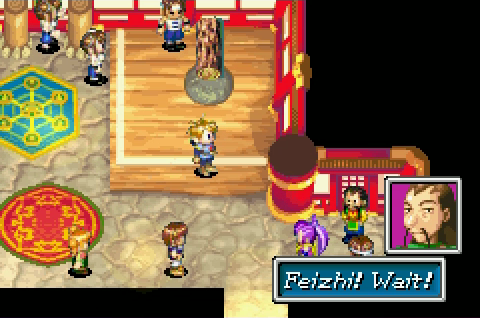
Going off of what I proposed last Fixing Golden Sun, Tret was killed the first time we ran through the forest. Now that we've returned from Mercury Lighthouse, McCoy's men have finished clearing the overgrown and dangerous path to Eastern Mysticism land. Once again, this part is problematic because nothing between Imil and Tolbi has any impact on the story. Ideally, I would cut this segment of the world at least in half and have Venus Lighthouse come much sooner, but that would really only work if Golden Sun and its sequel were fused into one game and could thus afford some faster pacing. Furthermore, I've routinely said that I'm modifying rather than fully rewriting, so let's look at another example of a much better RPG doing this successfully so we can figure out how to bring Golden Sun in line.
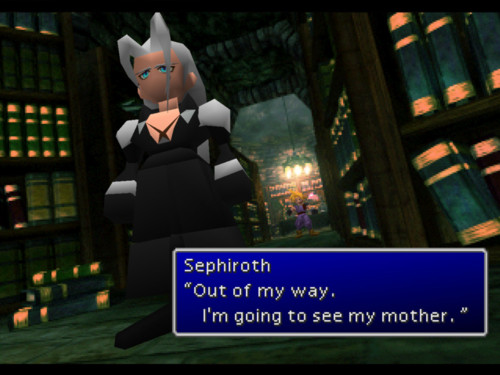
Final Fantasy 7, while probably not the second coming of the messiah that many people consider it to be, is another incredibly well-made example of how to do RPGs right. Interestingly enough, its first disc is relatively light on how it covers the overarching plot; Sephiroth is only encountered a few times and his exact goals are left fairly unclear. The first three hours contain a single mention of his name tucked away in a flashback that only refers to him as a great soldier.
Instead, the first part of the game is against a seemingly unstoppable corporation that seems to control everything, be it politics, the military, energy, or the day to day lives of Midgar citizenry. It's an unstoppable Goliath, and the attempt to bring it down involves a host of morally dark-gray actions and almost suicidal tactics. Then you get there and find out that Sephiroth did what you were aiming for in about five seconds. After a frantic escape, Cloud recaps his memory of Sephiroth: a man who snapped, burned a town down while slaughtering many of its citizens, and then seemingly disappeared. But now, oh shit, he's back.
For the first disc, this is somewhat in the background. Who really knows what he's actually up to? Most of the game is spent chasing after him and continually seeing reminders of his destruction (Oh hey, here's a gigantic snake that he impaled on a tree. Oh hey, here he is causing all sorts of chaos on a ship and shape-shifting into a demonic remnant of an ancient alien-goddess-thing. Oh hey, now he's brainwashing Cloud into giving him whatever he desires.) Throughout the first disc, you are constantly losing and playing damage control while continually seeing evidence of Sephiroth's strength. Then, after spending a third of the game setting him up, we get the series of breaking points: He's summoning a meteor to destroy the Earth, he wants to make himself a god, the planet itself is struggling to take sides in this fight, alliances are reshaping, and he just killed your love interest. Now we have two discs to kill this man, and by this point we want to.
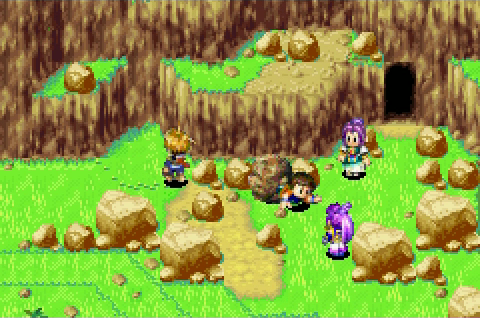
Golden Sun has terribly nonthreatening villains, but this should be the section of the game were we really start seeing what they're up to. S&M should embrace a brand of Joker-level insanity to compensate for incompetence (as touched on before, this fits with the plot twist of them having a noble intention but being terrible at enacting it, working in the revelation while still making you a noble protagonist). If this is going to be a long pilgrimage of nothing, make it so that S&M's trails of destruction are well noticed. Give us a shot of Silk Road as not just having some dust in the way but being 100% inaccessible. Altin? Get rid of the "stones hit statues made of other stones" element and make it so S&M flooded the town in frustration because somebody tried to stop them going through the mines. Saturos and Menardi should be completely reshaping the world around them and constantly forcing you to take absurd detours, which can be why you have to go through caves and mineshafts.
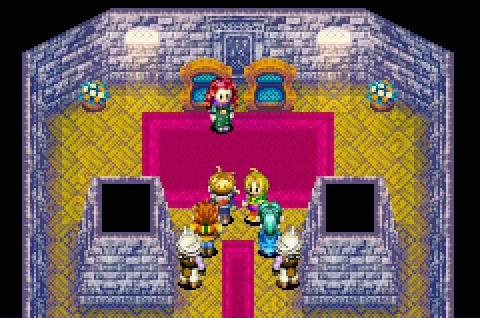
Saving Hammet should be delayed until the second half of the game (meaning TLA). Ivan's whole storyline falls apart when he gets back in the picture, as does the Shaman Rod negotiation, so use Kalay to hammer in the inhospitable idea. When talking about Hammet's backstory, it should be more about him getting cocky. He got saved once, so he feels fine risking his life, but now people in Kalay think he was an idiot for going off into the world alone and leave him for dead. This is why Ivan is only now getting told all of this stuff about where he came from: He's now the adult of Kalay. It can be a side-story used for *gasp* character development, like how FF7 lets Barret see what Corel has become and Red XIII see his petrified father.
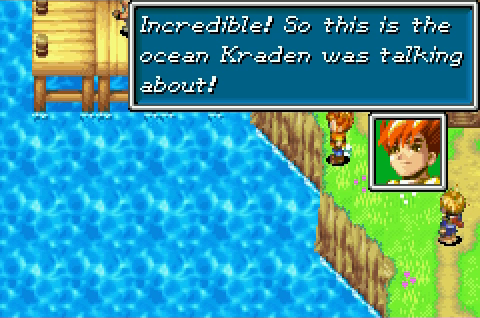
For as much as I complain about it, this ship can stay as long as it's actually set up. The world being inhospitable and terrible takes care of this nicely, and getting rid of pretty much all of the text (especially the "find the anchor" game that accomplishes nothing) could make it tolerable. Axe the Crossbone Isle dungeon here and leave it for later.
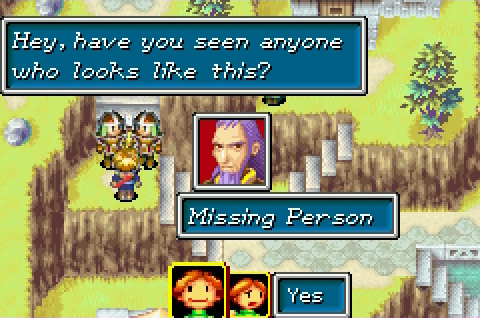
Tolbi is under martial law and in a complete panic. People can enter but cannot leave, and everyone is under suspicion for being involved in Babi's disappearance. Colosso has been postponed and people are on the verge of riot; basically, Tolbi is a pressure cooker. Make Iodem the voice of reason; he recognizes something is up and connects the dots, sending you guys out to find Babi because he sees you using psynergy in some way. Iodem should know about psynergy, and he can play the exposition role as you become a stranger in a strange land. Iodem should openly call Babi a tyrant: he's a terrible power-hungry monster, but he's the reason Tolbi hasn't gone under. Tolbi is a city, not just a collection of villages; design it to be gigantic and at least three times as large as it currently is. This is why Babi can get away with what he does; his city is the city, and without him everything would fall apart. Iodem knows that, for all his power grabbing and immortality seeking, he needs to stay. In other words, Tolbi is exactly Chicago.
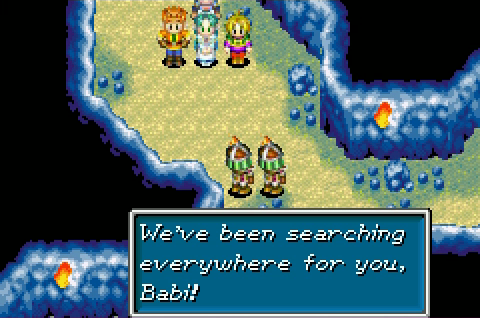
As you rescue Babi, he needs to exert this dominance. You aren't helping him out of kindness or "an oath", but because Babi and Iodem are going to make you. They'll give you what you need, but they can see that there's something special about you and you can get Babi the immortality he needs. He's kidnapped magic Sheba and started having Lalivero try breaking through or building an alternate path into Venus Lighthouse for his Lemuria-finding purposes (building another lighthouse is a terrible idea that should go). Still, he needs to make sure you have what it takes. All of this is directly relayed by Iodem, giving him a use.
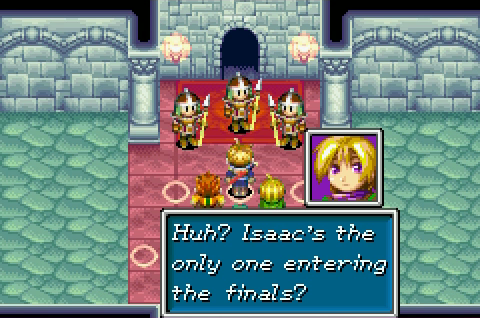
Colosso, then, isn't a reward but a trial. Rather than any excitement or sense of duty, the characters are incredibly afraid and clearly point out how insane it is that Babi is making you risk your lives so he can make sure you're worth the investment. When you succeed, he issues you the "Find Lemuria" ultimatum and sends Iodem along with you not to help you but as a gun to your head making sure you do exactly what he needs.
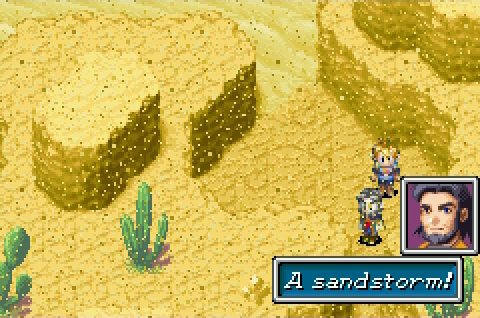
The desert was always dangerous, so Babi actually made a road network giving this part of the world a bit of civilization. This way, we get the idea of Babi as a necessary evil and again see S&M's power as they destroyed it, forcing you to take the crazy alternate route.
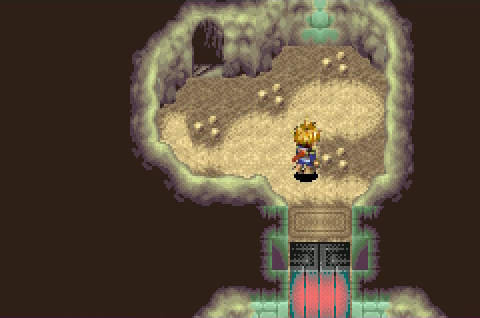
Entering the lighthouse should have nothing to do with Reveal. Instead, I would just make it outright magic; some sort of forcefield only you guys can pass through due to being the magic chosen ones or something. There really isn't any decent way to restrict the lighthouse entry to only adepts, especially since Venus tends to involve pushing things from slightly far away, so just don't bother trying to rationalize it and let everyone else get abandoned. Now we're all on our own against an opponent we've only been seeing indirectly, and now there's at least a bit of a sense of finality to all of this.
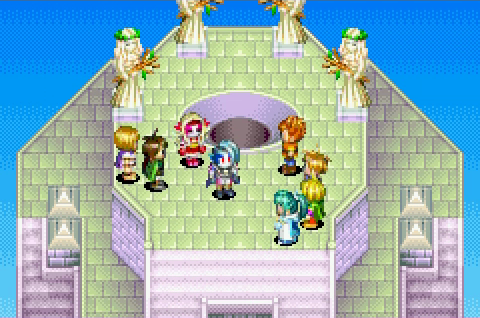
Sheba is up here, which tells us she must be an adept also. We know nothing about her except what was relayed by Iodem, but Felix and S&M seem to be arguing about her intensely. We burst in, and Felix takes this opportunity to be frank, begging us to save Sheba and finally uttering the pivotal phrase "save the world". We don't exactly know what's going on, but Felix begs us to save Sheba and Garet's personality and memory of Felix makes him decide to take that chance. S&M ask for the Mars Star, but we don't have it (we chased after them without it; it's back in Vale, which allows for a nice homecoming scene next game). They decide to ask for the Rod instead, but negotiations go terribly wrong and we end up fighting. Post-fight, we ask Felix what he meant by saving the world, and now we get the plot twist here rather than midway through the next game. He throws the star himself, starts to explain that the lighthouses are vital to saving the world, and then shit hits the fan. The lighthouse splits apart, Felix and Sheba rush off, and we get a glimpse of Lemuria. We narrowly escape the chaos (which doesn't fix itself), and get down to the bottom. We relay what happened but are forced to admit that we failed, completely and unequivocally. But hey, what was that about saving the world...?
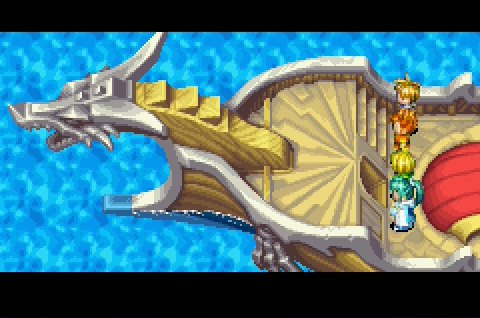
Now we can get on a ship with a need to do better next time, some character development, and a new perspective on what was happening. What will happen next time? Who knows; but I sure wouldn't mind paying $40 this time. Maybe I would even play The Lost Age.
The thing is, none of this is difficult, but so many games (like this, or Heavy Rain, or Chzo) don't seem to think through what's happening and why. It's a shame, because we shouldn't have to defend our good memories of this game by couching them in half-remembered nostalgia and poor excuses. This game disappointed me immensely, and for all the wrong reasons. Focus testing or an editor could have salvaged so much, but the end result was... this.
Phew. Now, if you need me, I'm going to go on some Chrono Trigger detox.